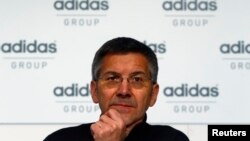FRANKFURT, GERMANY —
Several top German executives have criticized U.S. and European action against Russia after the latter's annexation of the Crimea region triggered the worst East-West crisis since the Cold War, Die Welt newspaper reported on Saturday.
Herbert Hainer, chief executive of sporting goods maker Adidas, told the German newspaper he believed the West waited too long to start talks with President Vladimir Putin when tensions between Russia and Ukraine rose.
"We should ask ourselves if someone like Putin shouldn't have been part of the process much earlier, instead of holding off with talks until it's too late," he said.
Adidas has a high exposure to the Russian market, where it operates over 1,000 stores. Its share price has taken a hit, falling 15 percent since the start of the year, at least partly on concern over the Crimea crisis.
The European Union, United States and other Western nations have imposed sanctions on Russia in response to its seizure of the Crimea region and have threatened broader economic penalties if the crisis escalates.
Russia is Germany's 11th biggest commercial partner, with trade reaching 76.5 billion euros ($105 billion) last year, according to the trade association Ost Ausschuss.
Many companies are worried about losing out on business if further sanctions take effect. Some 300,000 German jobs are linked to business there and Europe's biggest economy depends on Russia for 35 percent of its gas.
Meeting Putin
Some German executives are taking steps to ensure their business is not put at risk.
The head of Germany's state railway said this week he planned to travel to Moscow. Joe Kaeser, chief executive of engineering giant Siemens, drew criticism from some German politicians for meeting Putin on Wednesday.
Steelmaker ThyssenKrupp's Chief Executive Heinrich Hiesinger said the events of the past had shown that great change could be achieved if the West cooperated with Russia rather than being confrontational.
"Now we have a situation in which Russia feels that its back is against the wall," he said, adding Russia and the West had to find a diplomatic way out of the crisis.
Logistics group Deutsche Post DHL's Chief Executive Frank Appel told Die Welt he believed there were few viable alternatives to Europe's dependence on Russian gas.
"Since we don't have major sources of raw materials in Europe, we will always be dependent on others," he said.
"And it seems questionable to me whether dependence on the Middle East or Venezuela would be better than that on Russia."
Herbert Hainer, chief executive of sporting goods maker Adidas, told the German newspaper he believed the West waited too long to start talks with President Vladimir Putin when tensions between Russia and Ukraine rose.
"We should ask ourselves if someone like Putin shouldn't have been part of the process much earlier, instead of holding off with talks until it's too late," he said.
Adidas has a high exposure to the Russian market, where it operates over 1,000 stores. Its share price has taken a hit, falling 15 percent since the start of the year, at least partly on concern over the Crimea crisis.
The European Union, United States and other Western nations have imposed sanctions on Russia in response to its seizure of the Crimea region and have threatened broader economic penalties if the crisis escalates.
Russia is Germany's 11th biggest commercial partner, with trade reaching 76.5 billion euros ($105 billion) last year, according to the trade association Ost Ausschuss.
Many companies are worried about losing out on business if further sanctions take effect. Some 300,000 German jobs are linked to business there and Europe's biggest economy depends on Russia for 35 percent of its gas.
Meeting Putin
Some German executives are taking steps to ensure their business is not put at risk.
The head of Germany's state railway said this week he planned to travel to Moscow. Joe Kaeser, chief executive of engineering giant Siemens, drew criticism from some German politicians for meeting Putin on Wednesday.
Steelmaker ThyssenKrupp's Chief Executive Heinrich Hiesinger said the events of the past had shown that great change could be achieved if the West cooperated with Russia rather than being confrontational.
"Now we have a situation in which Russia feels that its back is against the wall," he said, adding Russia and the West had to find a diplomatic way out of the crisis.
Logistics group Deutsche Post DHL's Chief Executive Frank Appel told Die Welt he believed there were few viable alternatives to Europe's dependence on Russian gas.
"Since we don't have major sources of raw materials in Europe, we will always be dependent on others," he said.
"And it seems questionable to me whether dependence on the Middle East or Venezuela would be better than that on Russia."












